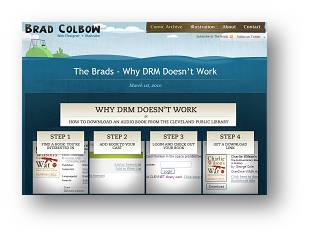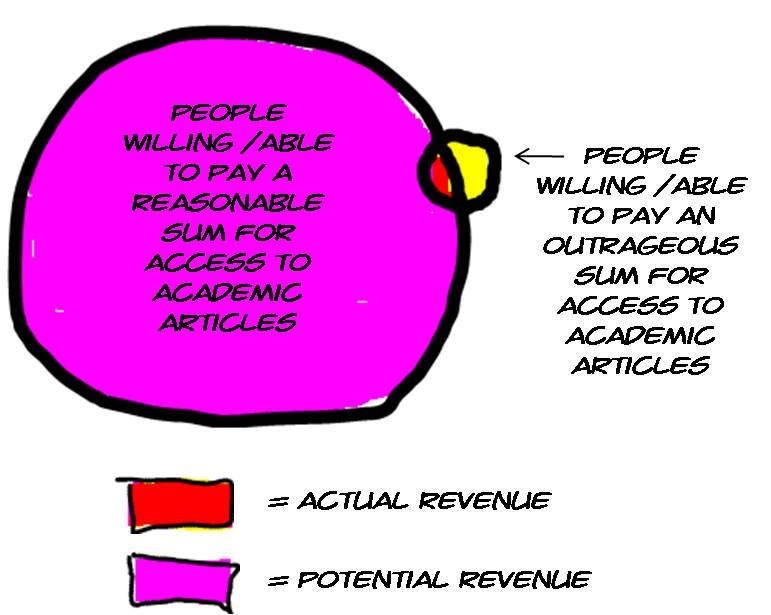Okay, yes, I am overreaching in the title of the post, but it was satisfying to write that because I am so massively frustrated by this. The question is this: academic publishing – who thinks this model works?
 I was reading this blog post, and found myself nodding a lot
I was reading this blog post, and found myself nodding a lot
I was trying to look at an academic article the other day, and it was $30 for a 24-hr subscription to a fairly random, 15-yr old article. Um, excuse me, but wtf?
What is this accomplishing? And who is the audience for this? If you are an academic for an institution, you either a) already have access because your institution is subscribed, or b) are not buying this article because it’s stupidly expensive (see blog post above).
I’m not an academic, but I am passionate about evidence-based practice, and I think this model is killing any impulse on the part of practitioners to make regular use of academic research. We’ve rebuilt the Library of Alexandria online, and we are gate-keeping through greed (and not just greed, but stupid greed). We have a bigger repository of searchable knowledge than we could have imagined even 50 years ago, but the practitioners (i.e. the people who DO and MAKE stuff every day) are shut out of a lot of it. Who knows? The solutions to the world’s problems could be there if more people could make use of it (there’s the “destroying civilization” tie-in).
We settle instead for it trickling down in mediated forms – TED talks, Malcolm Gladwell books, ScienceDaily.com – but this restricts the flow to what someone else thinks is important, and at best oversimplifies the information, and at worst distorts it.
I get (and have voiced) the argument that academic publishers are not wild centers of profitability, and do need to fund themselves. I think this is true, but it’s not a compelling argument because it’s a stupid financial policy.
I do think they’d need to work kind of hard to realize that potential revenue because they’ve created a sense of learned helplessness in their potential audience. But do the math — would you rather have:
3 people paying $30 / article = $90
or
100 people paying $3 / article = $300
I’ll admit that I’m making those numbers up, but try these (which I can back up):
Times I would have paid $3 if I could = more than 2 dozen (Revenue $72+)
Times I have paid $30 = never (Revenue $0)
And that’s a very conservative estimate based just on personal usage – I’ve worked on client projects where I could have happily justified expensing the purchase of a dozen articles as part of the research/analysis phase, but not at $30 a pop (especially since you frequently don’t know if the article is useful until you can see it).
If you make something hard, people will usually find ways around it:
 “Getting around it” works for things like music files – illegal file sharing was the only reasonable way to get digital music before iTunes made it easy and cheap to buy music online. My fear, though, is that in this case people won’t find ways around it – they just won’t cultivate the habit of making use of the amazing wealth academic research as part of their professional practice (aaaand we are back to the destruction of civilization).
“Getting around it” works for things like music files – illegal file sharing was the only reasonable way to get digital music before iTunes made it easy and cheap to buy music online. My fear, though, is that in this case people won’t find ways around it – they just won’t cultivate the habit of making use of the amazing wealth academic research as part of their professional practice (aaaand we are back to the destruction of civilization).
There are services like http://www.deepdyve.com/ which are doing pretty much *exactly* what I want, but I haven’t yet had a ton of luck finding specific articles on it (it works better for topic searching). And I fear it will fall in to the adoption chasm if the bigger publishers and services don’t get on board.
So, yes, I know the blog title is hyperbolic excess on my part, but this is so clearly a business model that hasn’t woken up and smelled the new millennium, and I think it’s getting worse, not better (a lot of things that wouldn’t have been firewalled a few years ago are finding their way into these expensive repositories).
</rant>


Right you are, and you said it very well. Hyperbole communicates– and you did.
Thanks Allison!
Looking forward seeing you speak in Minneapolis next week, by the way
Agreed. Provocative post. An academic friend of mine just published his first book – I wanted to buy it not only because he’s my friend, but because the content is interesting and in my field. But it’s $130! His contributions are going to be lost to anyone who doesn’t ask their library to order it and then go into the library to read the physical copy. And I’ll admit, despite being an academic myself, if I can’t access an article on line, I’ll more often than not find an on-line alternative. Luckily I have great access to viable alternatives through my university, which spends big bucks on subscriptions, but that’s a unique privilege.
I’m interested in the viability of academic knowledge, which moves at a slower pace (in terms of production and dissemination) than information in general. This post really gets at that issue. Will link to you here: slowknowledge.wordpress.com
Thanks, Carey. It’s difficult because I understand that many of these publications have a very small audience, and they get priced accordingly (small # of purchasers = either charge a high price, or don’t publish it at all). But there does need to be a balance point, and I’m pretty sure $130 for your friend’s book isn’t at that point.
There’s also probably a price point basement for individual articles where if it goes lower than that, it undercuts the institutional subscription price – no idea what the math would be on that, but I’m quite sure it’s much lower than $30 / article.
Interesting stuff on your blog! Was there a particular post you were referring to?
Okay, slightly hyperbolic. But soooooooooo right.
What especially sticks in the craw is the fact that we’ve probably paid for the research out of taxes. (I’ve added in the ‘probably’ for readers in the US. In Europe, there’s no doubt – we actually did pay for it.)
I’m guessing you’ve seen the ever-wonderful Dave Gray’s Free the Facts?
I’ve got pretty good over the last few months at using The Google to find things behind paywalls. Most HBR articles, for example, are out there somewhere, often on corporate extranets. I’ve also built up a collection of contacts who don’t mind downloading the odd piece for me through their academic subscriptions. And, apparently, we can join our local university’s library and get all the stuff for free – but I haven’t worked out how to do this without having to spend all my time at the actual university.
But I still only get around 20% of the things I’m after, and it’s time-consuming to boot.
Interestingly, it might be domain-specific. Games-related research is virtually all online. Behavioural Economics is readily available too. Pschology and learning-related research, though? Forget it.
I couldn’t agree more! I loved Emerald and as a Masters student, I had access to it as part of my uni fees.
However, as an individual, I can’t justify paying the high price of subscription or even per article.
There is so much learning research out there that you can’t access out of professional interest because the costs are prohibitive.
Imagine if Emerald subscripton was $30.00 annually – I’d do it and so would many of my colleagues. But it’s $30 an article!
So instead of getting any money, they get nothing from me.
Crazy. And the people who would benefit from the reserach (uh, professonals like me) don’t get to read it.
For anyone out there interested in learning research that is published free, NCVER publishes Australian government funded research: http://www.ncver.edu.au/
There’s lots of good stuff here.